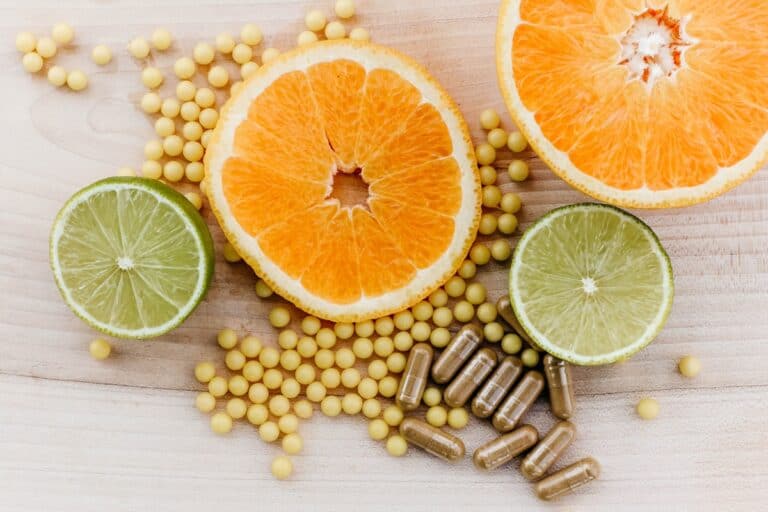Vitamin deficiency will hurt your prostate, aggravate prostate enlargement and cause a higher risk of prostate cancer.
In this video, you’ll learn the 6 best vitamins for prostate health that every man needs to know. These 6 vitamins will help you shrink enlarged prostate, improve urinary flow and maintain a healthy prostate naturally.
Not knowing these and getting insufficient vitamins can make you more likely to get prostatitis, enlarged prostate and prostate cancer.
Enlarged Prostate (a.k.a Benign Prostatic Hyperplasia or BPH) is a common health problem for men, especially those over 50.
This condition in men will cause frequent night-time toilet trips, being unable to empty bladders, and leaking urine in front of others. So what’s going on here?
What Is Prostate Gland?
The prostate is a walnut-sized gland that sits just below the bladder and surrounds the urethra.
The main function of prostate gland is to add prostatic fluid to semen and help push semen through the urethra. It also plays a role in hormone production and helps regulate urine flow.
The problem is the prostate often gets bigger than usual as men get older, it squeezes the urethra and makes the bladder work harder to push urine out.
Over time the bladder muscles get weak and make it harder for it to empty. This can lead to weak urine flow, frequent urination at night, urgent need to pee, incontinence, urinary tract infections and bleeding.
Best Vitamins for Prostate
Now let’s explore the 6 best vitamins for prostate health that can shrink your enlarged prostate and prevent prostate problems naturally.
Keep in mind we use the word “vitamins” in a broad way to include minerals, phytonutrients and herbs that you can use to shrink enlarged prostate naturally.
Just a reminder that this video is just for learning. If you have medical concerns, please do speak to your doctor.
So without further ado, let’s get started.
1. Vitamin D
Vitamin D is an essential fat-soluble vitamin for the human body, it plays a vital role in regulating cell growth and differentiation, which is essential for maintaining the health of prostate cells.
Research has shown that Vitamin D binds to specific receptors in the prostate and bladder, and reduces inflammation and prostate growth.
A study in the Journal of Prostate Cancer found that lower Vitamin D levels were associated with a higher risk of BPH among middle-aged and elderly men.
Another study in the Journal of Urology found a correlation between lower Vitamin D levels and increased prostate volume in men with BPH.
To get enough vitamin D, there are many ways.
One of the most natural sources is sunlight exposure. When your skin is exposed to sunlight, it triggers the production of Vitamin D in your body.
You can also get it through certain foods. Some good food sources of vitamin D include eggs, mushrooms, fatty fish such as salmon and mackerel, fortified dairy products like milk, yogurt, and cheese.
Many people also would like to take Vitamin D supplements to ensure adequate Vitamin D levels. A suggested daily intake for adults is around 600 to 800 International Units (IU) or 15 to 20 micrograms (mcg).
2. Vitamin C
Vitamin C is an important nutrient for our bodies, and we need to get it regularly from plant-based foods like vegetables, salad leaves, fruits, and berries.
Eating foods like strawberries, cabbage, bell peppers, sauerkraut, and cruciferous veggies like broccoli can strengthen the antioxidant network in our bodies.
The real Vitamin C complex helps prevent or reduce oxidative damage to our prostate cells and lowers the risk of getting prostate cancer.
It also helps regulate the production of cortisol, which is another hormone that can disrupt our hormone balance and potentially cause prostate issues.
Stay away from those “ascorbic acid” supplements you find at the store, because they only contain 5% of the real Vitamin C complex.
If you want to take supplements, go for whole fruit powders like acerola cherry, rose hips, or camu camu.
3. Zinc
Zinc is a really important mineral for shrinking an enlarged prostate and balancing male hormones.
Zinc helps prevent testosterone from being transformed into estrogen or DHT by inhibiting certain enzymes (aromatase & reductase).
This helps fix the hormonal problem that causes your prostate to grow, and it also helps reduce inflammation, so the prostate gland can start to shrink.
If you want, you can start taking a 30mg daily intake of zinc chelate.
Or you can get it from foods, such as pumpkin seeds, watermelon seeds, beef, oysters, crab meat, organ meats, and dark chocolate (sugar-free).
Please note if you’re taking a zinc supplement, make sure you’re also taking copper as part of a bend of trace minerals. Because too much zinc will deplete your copper.
4. Phytosterols
Phytosterols (plant sterols) are natural chemicals found in certain plants that have been shown to help shrink enlarged prostate back to its normal size, and help improve urine flow by blocking DHT.
Research has also shown that phytosterols can help reduce the risk of heart disease by preventing cholesterol from sticking to the artery walls.
Moreover, phytosterols are used by men to prevent male pattern baldness and hair loss, which are also caused by DHT imbalance.
The best foods of phytosterols include pumpkin seeds, macadamia nuts, sesame oil, green peas, and extra virgin olive oil.
You can consider to eat these foods regularly, especially pumpkin seeds.
5. Lycopene
Lycopene is an antioxidant that can be found in all different types of tomatoes. That is a carotenoid that helps protect the cells in the body from oxidative damage.
Research shows that consuming lycopene can help shrink prostate size, lower PSA levels, and reduce the risk of prostate cancer by balancing testosterone levels.
This is very good for older men, because as we get older, testosterone levels in our body will drop, which causes estrogen levels to rise and the prostate to grow.
Interestingly, cooking tomatoes actually makes lycopene four times more easily absorbed by the body. So it’s a good idea to include homemade cooked tomatoes regularly in your diet, as they’re a superfood for your prostate health!
Other food sources of lycopene include basil, grapefruits, goji berries, and asparagus.
And you can also find lycopene in certain prostate health supplements that contain blends of plant chemicals. However, it’s easier to simply get it from food.
6. Saw Palmetto
Saw Palmetto is a natural plant extract made from the berries of saw palmetto tree, it has been used for centuries to treat prostate enlargement.
Though the exact mechanism of how saw palmetto works is not fully understood, some studies have shown that Saw Palmetto mimics the function of the 5-alpha reductase inhibitors to inhibit the effects of DHT, which can slow or stop the growth of the prostate gland.
Besides, research has shown that saw palmetto may help reduce prostate inflammation and improve urinary flow.
Many case studies in controlled clinical trials have found saw palmetto to be an effective treatment for BPH symptoms.
While saw palmetto is typically considered to be safe, it can interact with some medications, so it is important to speak to your doctor before taking it.








